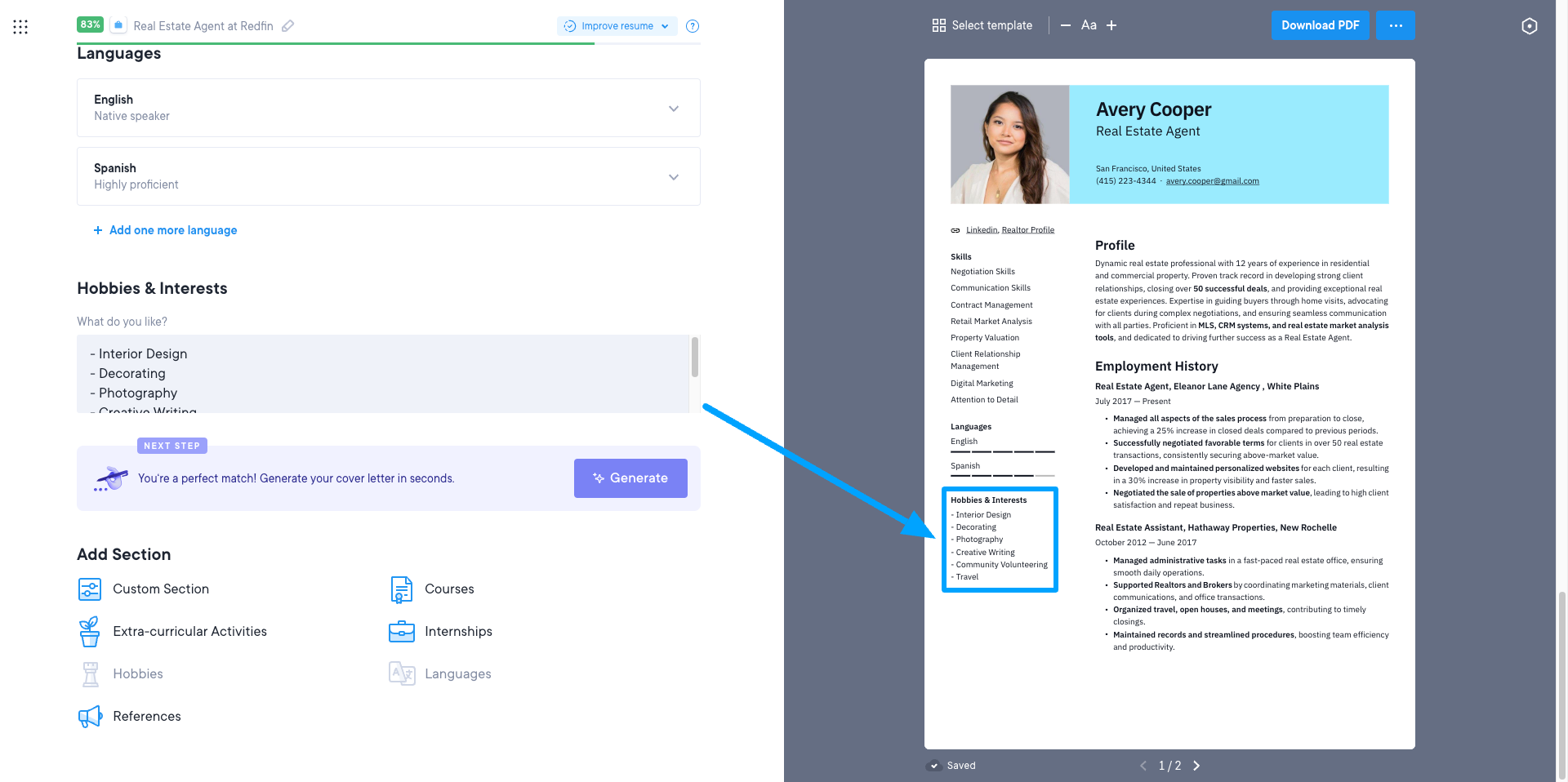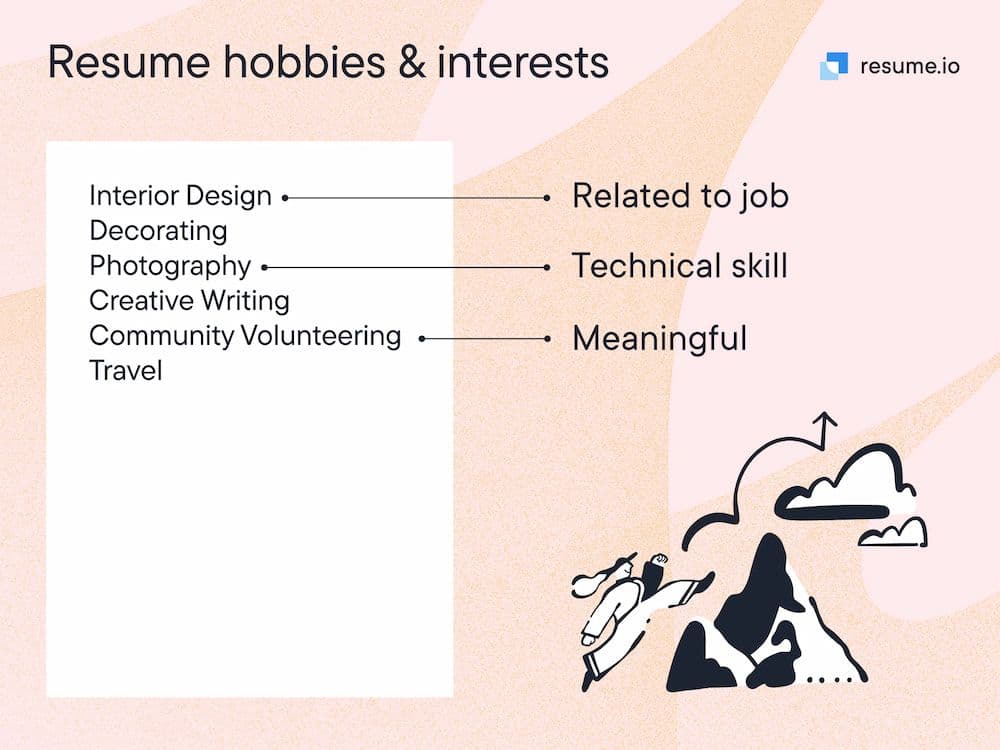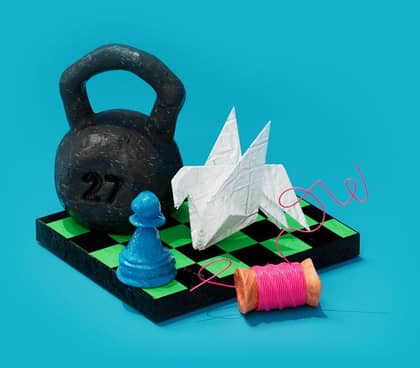Typical resume convention says not to include hobbies and interests on your resume—it can introduce bias, take up unnecessary space, and share irrelevant details.
However, did you know there are some very good reasons to include hobbies and interests? It’s just a matter of determining the most impactful interests to put on your resume.
We walk through when to include hobbies and interests on your resume, where to put them, and several examples to consider.
Jump straight to the list of hobbies and interests.
Where to put hobbies and interests on a resume

Once you’ve got good interests to put on a resume, you need to find the right spot for them.
Even if you’ve got compelling hobbies, your work-related experience and skills will always be most important and should come first. This means you should keep your list of hobbies and interests at the bottom or side of your resume so you don't make the mistake of detracting from your professional expertise.
Where to include hobbies and interests on your resume:
- Dedicated section – Add a "Hobbies and Interests" section after your skills section, listing a few relevant or impactful activities.
- Personal profile – Mention a hobby only if it strongly supports your career goals, fills an experience gap, or aligns with the employer’s industry. Use a brief explanation in your profile summary at the top rather than a full list.
Why list hobbies and interests on a resume
If hobbies and interests are inherently related to your professional path, why include them?
There are a few reasons:
- Highlight soft and hard skills. While you’ll likely have a separate skills section, showcasing hobbies and interests can add additional context. It can be especially helpful if your hobbies have helped you hone skills you haven’t had the opportunity to gain in past jobs or if you don’t have much work experience.
- Show off your culture fit. Some hobbies will help you tailor your resume by showing your passion for the industry, like leading a hiking club when you’re applying to an outdoor gear retailer. Others show leadership, commitment to diversity and inclusion, or other values.
- Set yourself apart. As one of maybe hundreds of applicants, it’s imperative to stand out. The inclusion of a few impactful hobbies could be the difference between being a top candidate and missing out on an interview.
- Document your talents. Perhaps you’ve won an award for a hobby or competed at a high level. This can show your unique talent and your ability to work hard for a positive outcome.
125 Examples of hobbies and interests
Sports and fitness
These types of interests and hobbies show teamwork, perseverance, adaptability, resilience, and discipline.
- Baseball
- Swimming
- Skiing
- Yoga
- Dance
- Gym
- Running
- Cycling
- Rock climbing
- Martial arts
Outdoor activities
Show off your love for the great outdoors—as well as your decision-making, focus, and challenge-solving.
- Fishing
- Mountain climbing
- Gardening
- Camping
- Orienteering
- Hiking
- Birdwatching
- Kayaking
- Surfing
- Scuba diving
Music and performance
Display your appreciation of the finer things in life by detailing your interest and talent for the arts.
- Band or orchestra
- Songwriting
- Singing
- Playing guitar
- Playing piano
- DJing
- Music production
- Collecting vinyl records
- Music history research
- Attending concerts
- Acting
- Theater
- Stand-up comedy
- Movie analysis
- Improv
- Storytelling
- Voice acting
- Puppetry
- Film editing
- Performing magic
Arts and crafts
Showcase your creativity, eye for detail, and focus by displaying your arts and crafts hobbies.
- Painting/drawing
- Sculpture
- Photography/video production
- Design
- Pottery
- Calligraphy
- Origami
- Animation
- Mixed media art
- Graphic design
- Woodworking
- Knitting
- Sewing
- Home brewing
- Jewelry making
- Scrapbooking
- Candle making
- Soap making
- Furniture restoration
- Model building
Writing
Nearly any job you’ll encounter will require writing, so call out your affinity for the written word.
- Blogging
- Journaling
- Short stories
- Poetry
- Journalism
- Screenwriting
- Playwriting
- Editing
- Copywriting
- Book reviewing
Volunteer work
Taking time out of your busy schedule to give back to others says a lot about your values. Let your volunteer work speak for itself.
- Charity/fundraising
- Community events
- Environmental work
- Coaching/mentoring
- Tutoring
- Animal shelter work
- Homeless outreach
- Disaster relief efforts
- Advocacy campaigns
- Teaching workshops
Technology
Technology continues to advance, meaning there’s no shortage of new things to learn and play around with. And many are relevant to the workplace!
- Stock trading
- Coding
- Artificial intelligence
- Game development
- Robotics
- Website design
- Mobile app development
- Cryptocurrency analysis
- Cybersecurity
- 3D printing
Internet activities
Along with technology, the internet at large is continuing to grow and change every day. Show off how you engage with the world using the World Wide Web.
- E-sports
- Vlogging
- Social media
- Podcasting
- Live streaming
- Online forums
- Blogging platforms
- Virtual world creation
- Online coaching
- Influencer marketing
Pursuit of knowledge
Love to learn? That looks great to hiring managers, so show off those intellectual curiosities.
- Language learning
- Chess
- Trivia
- Debate
- Philosophy
- Public speaking
- Researching genealogy
- History reenactment
- Astronomy
- Reading novels
Food and drink
If you’re a foodie at heart, showcase some of the ways you innovate with food.
- Cooking
- Baking
- Wine tasting
- Coffee brewing
- Mixology
- Food blogging
- Exploring cuisines
- Meal prepping
- Cheesemaking
- Pickling
Miscellaneous
Don’t feel limited by standard categories—share what most excites you!
- Mindfulness
- Meditation
- Collecting antiques
- Traveling
- Urban exploration
Looking for additional resume writing tips and templates to showcase your hobbies and intrests ? We’ve got you covered with ATS templates, Google Doc templates, two-column templates, and plenty of other templates.
Plus, we walk through when to use a resume writer, how to use ChatGPT for your resume, and where to post the finished product.
How to pick the right hobbies and interests
With so many options to choose from, it can be hard to decide which to include. Start by making a list of all of the hobbies and interests you regularly engage in. Think, too, about the type of work you want to do and the skills and experiences required.
Once you’ve got some ideas, consider adding only the most beneficial. Think about what you’ve learned or what skills you’ve built from your hobbies—are they relevant to the job at hand? Does this hobby or interest show off your passion for the work the company does? Does it set you apart some other way, like showing how you’re a self-starter or creative individual?

Ultimately, you want to choose hobbies and interests that show how you’re a fit for the job you’re after. Below are a few examples of this in action.
| Job requirement: | Task: | Hobby / interest: |
| Written communication | Writing articles for the intranet | Maintain a cooking blog |
| Ready to travel | Responsible for the business in Asia | Travel |
| Delegate/lead | Delegating tasks to a team of interns | Coaching youth team |
| Being able to work well together | Collaborate in various multidisciplinary teams | Volleyball |
| Affinity with the industry | Relationship management of sports clubs | Hockey and athletics |
Real estate agent hobbies and interests
Copyable box: of example Hobbies and interests
- Interior Design
- Decorating
- Photography
- Creative Writing
- Volunteering
- Travel
These hobbies tie well into real estate work because they demonstrate an eye for aesthetics, creativity, and a commitment to building relationships and working within the community.
Check out a complete real estate resume example here.
Education (teacher) hobbies and interests
- Reading
- Creative writing
- Mentoring youth
- Drama/theater
- Community volunteering
- Public speaking
These hobbies and interests show off your interest in building and sharing knowledge (reading and writing), presenting to groups (public speaking and theater), and serving others (mentoring and volunteering).
Check out a full education resume example.
Engineering (electrical engineer) hobbies and interests
- Robotics
- 3D Printing
- Coding/Programming
- DIY Electronics
- Chess
- Astronomy
Show off your engineering knowledge by sharing related hobbies like these. Each one proves your interest in programming, problem-solving, or electronics.
Take a look at an electrical engineer resume example.
Retail (shop assistant) hobbies and interests
- Fashion design
- Makeup artistry
- Photography
- Social media content creation
- Cooking/Baking
Your interests in fashion, makeup, and photography will show off your aesthetic and design sense while volunteering with the public makes it clear you’re an excellent people person.
Take a look at our shop assistant resume example.
Legal (lawyer) hobbies and interests
- Debating
- Public speaking
- Writing
- Chess
- Community advocacy
- Philosophy
Lawyers need to speak and debate confidently, write comprehensive and convincing legal briefs, and think critically and strategically. These hobbies show you’re practiced at doing just that.
Take a look at our lawyer resume example.
Confused about the differences between hybrid, functional, and other resume formats? Wondering how to decide about a summary or an objective, or whether a picture belongs on your resume?
You’re in luck! We’ve got plenty of resume tips, complete with helpful dos and don’ts to avoid landing in the “ bad resume” pile.
When NOT to list hobbies or interests in your resume
While it’s clear hobbies and interests on your resume can benefit your job search, there are times they should be avoided. There are also certain types of hobbies you should keep off of your resume. Be mindful of the following:
- Illegal or dangerous activities. You don’t want the hiring manager to question your judgment.
- Overtly religious or political activities. Mitigate bias by keeping these off your resume or keeping them vague, unless they’re specifically relevant (e.g., you’re applying to work at a church where you’re a parishioner).
- Highly unusual hobbies. While these may be a conversation starter, you should also avoid introducing distraction or confusion to the reader.
- Inaccurate information. Don’t exaggerate your proficiency in a given area; you never know if the hiring manager has experience with the same hobby and plans to ask detailed questions.
- An extensive list. Keep your hobbies section brief.
- Hobbies from the distant past. Your resume shouldn’t go back more than 10-15 years, and that applies to your hobbies list, too.
You should also avoid adding hobbies and interests if it will take away from more important resume sections, like your header, education section, or summary.
For example, what is the image you get of someone with these hobbies and interests?
Darts, gaming, drag racing, watching movies
And what kind of colleague would this person be?
Golf, bridge, chess, playing the violin, culinary city trips
Resume hobbies and interests FAQs
Want to learn even more about hobbies and interests on your resume? Keep reading.
What is the difference between hobbies and interests?
Hobbies are activities you engage in for fun or enrichment. Typically, they're something you "do," meaning they are hands-on or require practice or participation. An interest, on the other hand, can be an area of curiosity or fascination but does not necessarily have to be an activity. For example, maybe you enjoy learning about birds (an interest) or going out birdwatching (a hobby).
How many hobbies or interests should you add to your resume?
It’s best to keep your list of hobbies and interests small. Ideally, this will be just a single line or two. If in a list format, consider listing up to 6.
You should only include the most relevant and impactful interests and hobbies, and make sure they’re ones you can truly speak to if asked. And if you don’t feel you have relevant hobbies or interests to include, it’s okay not to use this section at all and instead focus on more important bullets and keywords.
What are the most popular hobbies and interests to list?
The most popular resume hobbies and interests vary by job. The reason for this is that each job requires different skills, so the hobbies someone includes on a lawyer resume (such as writing, debating, or researching) will be vastly different from those on a software developer resume (which may include app development or video games).











